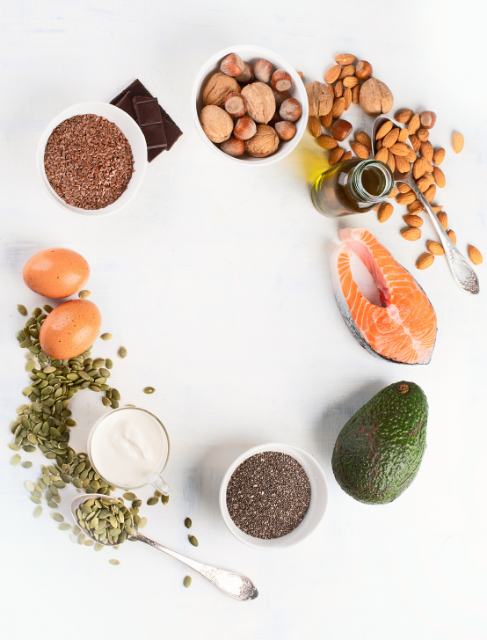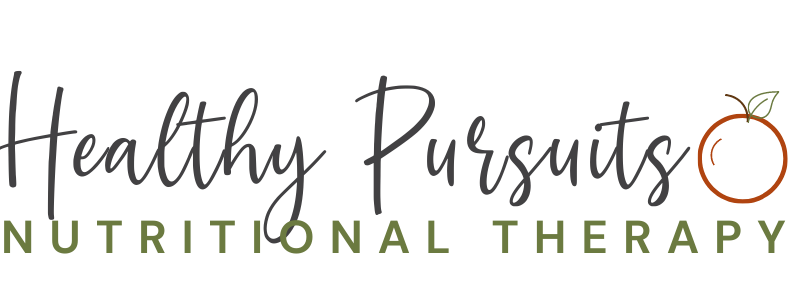
Healthy fats are an essential part of a whole foods, health-promoting diet. There are two specific fatty acids (LA and ALA) that are so essential that we must get them from our diet. There are many other fatty acids that we can technically synthesize on our own given the right building blocks but these two specific fatty acids have to be obtained from food. (One is an omega-3 fat and one is a type of omega-6 fat).
The good news about fat consumption is many people have begun incorporating more healthy fats into their diets. People I meet with often tell me they are eating salmon, olive oil, avocados, coconut oil, and various nuts and seeds. If you’re not eating those foods, I’d recommend it!
Other sources of healthy fats include those animal-based ones that still have a bit of a bad (undeserved) reputation. They include things like the fattier cuts of red meat, butter/ghee, full fat yogurt, cheeses, and whole eggs. The best way to ensure you’re getting the healthiest versions of these fats is to seek out grass-fed or pasture-raised versions. Animals store toxins in fat so if you’re not able to get properly raised animal foods, then sticking with the lower fat versions probably is best.
But are you breaking down those fats?
If you haven’t always had a diet full of healthy fats, plenty of veggies, and low in sugar and refined carbs there’s a decent chance that your body may not necessarily be breaking down and absorbing those healthy fats you’re now consuming. Low fat diets, high carb diets, STRESS, food sensitivities, autoimmune disorders, chronic inflammation, and increased intestinal permeability (aka “leaky gut”), can all contribute to a lackluster digestive process, including the process for fat digestion.
Fat digestion and absorption, like the rest of digestion, requires the proper hormones, glands, and enzymes to be triggered to perform their functions. Fats are absorbed through the small intestine but have to first be emulsified and broken down by bile and pancreatic enzymes. Bile is produced in your liver and stored in the gallbladder and when the fatty acids mixed with hydrochloric acid (aka stomach acid) reach the duodenum (the beginning section of the small intestine), the gallbladder is triggered by a hormone to release bile into the duodenum. This bile acts like dish soap on grease. It emulsifies it so that the fat can be broken down into its tiny fatty acid components and properly absorbed through the lining of the small intestine.
How this process can go wrong
The proper functioning of the digestive system relies on each previous part doing its job. The gallbladder may not release all the bile necessary if there isn’t adequate hydrochloric acid detected in the chyme (chyme is the mushed up food that has left the stomach). There might not be adequate hydrochloric acid production in the stomach if you are stressed or anxious while eating. Digestion occurs optimally in a parasympathetic “rest & digest” nervous state. If your brain isn’t there, you likely will not be producing adequate gastric juices for breaking down your foods.
The pancreas also relies on this same process and might not ‘get the message’ to release adequate amounts of enzymes to help break down those fats into their smallest fatty acids.
Another contributing factor to poor fat absorption is bile that is thick and doesn’t flow freely. Bile should be thin and easily flow from the liver to the gallbladder and, in the presence of fat, into the small intestine. Years on a low fat diet can contribute to thick bile because it will sit in the gallbladder not being used. A diet high in refined carbohydrates, vegetable oils, and trans fats can disrupt the balance of components that make up healthy bile.
How this effects YOU!
Paying attention to how well you’re digesting and absorbing fats doesn’t seem that exciting, I know! But the reality is it is so important for your health.
Are you tired, not sleeping well, unable to lose weight, feeling depressed, unable to focus well, or have joint and/or muscle pain or weakness? If so, you just may want to pay extra attention to what types of fats you’re consuming AND how well you may or may not be absorbing them.
Fatty acids play a huge roll in your body’s ability to function properly. If you have excess body fat that is a sign that some things are out of balance, possibly including adequate fatty acids. Fats are incredibly important for brain health and maintaining a steady emotional and mental state. A lack of proper fats and absorption leads to muscles that are easily fatigued, making exercise challenging (and increasing the lack of motivation to do it!). The synovial fluid in your joints also contains fatty acids, so a lack of good ones may be adding to joint pain and inflammation.
Great, what can I do about it?
The good news is you can absolutely have a big impact on how well you digest and absorb the fats you eat – increasing your body’s ability to maintain energy levels, improve sleep, lose unwanted body fat, level out your mood, and more! Here are a few ways to do this:
- Eliminate crappy fats such as soy oil, sunflower, safflower, canola, corn, cottonseed, and peanut. Organic cold or expeller-pressed versions of some of those (sunflower or canola) can be okay but unless that’s clearly stated on the label it is not. This is so important for not only this but so many other health issues. We consume far too many industrial seed and “vegetable” oils these days. You may not be cooking with them in your home but when we eat out or eat processed foods we are generally consuming these types of fats. I’m not suggesting you never eat out but limiting it or at least avoiding the fried options will help cut down on this. To find the places where these are lurking in your foods you have to make sure you’re reading labels!
- Reduce sugar and refined carbohydrates. These foods are just empty calories and when we eat them we tend to not eat other foods that are actually going to provide nutrients our bodies need. It requires nutrients to digest and absorb all foods so when we eat sugar and crappy carbs we end up with a net loss of nutrients. They are a burden on your liver, which among 500 or so other jobs is also producing the bile used to absorb those dietary fats. A diet high in sugar (or carbs that turn to sugar quickly) isn’t going to provide the nutrients necessary to build healthy bile and keep it flowing freely.
- Include foods that help thin bile. Lemon, beets, bitter greens like beet greens, dandelion greens (yes, you can eat those!), arugula and kale, radishes, celery, radicchio, apples, carrots, asparagus, cucumbers, and apple cider vinegar are all foods that will help keep your bile thin and running smoothly.
- Consume fats and foods with fat that wont cause inflammation. Olive oil, organic coconut oil, avocados, salmon and other cold water fatty fish, high quality omega-3 supplements, and grass-fed or pasture-raised meats and eggs.
- Increase probiotic-rich foods like sauerkraut, kimchi, kefir, or other fermented foods. These provide beneficial bacteria that will help the digestive process, as well as enzymes and extra vitamins and minerals. They also help to stimulate gastric secretions which in turn help fat absorption.
- Drink water! Aim for 1/2 your body weight in ounces of pure water. This is so important!
- Try to get into a relaxed state when eating. When we’re stressed or anxious, the digestive process is just not going to work well. Years of this adds up and can be one of main reasons for a digestive process that isn’t working optimally.
Wrapping it up.
Many people have done pretty well with getting away from a lot of crappy fats and oils but years of gut dysfunction can have you stuck in a place of not actually absorbing and utilizing the fats well that you are eating. Every cell in your body is made with fats so we have to make sure that we are not only eating the best versions and avoiding the bad, but also actually absorbing those goods ones!
